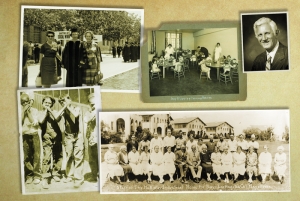Campaign to Support California Social Welfare Archives
May 30, 2014 / by Eliza Gallo- Giving
Housed in USC’s Doheny Memorial Library is a remarkable collection that preserves the history of social welfare programs in California, ensuring that the accumulated knowledge is not lost to future generations of social workers.
Now that collection – the California Social Welfare Archives (CSWA) – has launched an ambitious fundraising campaign to create an endowment, with the goal of giving the archive a long and stable future.
Esther Gillies, president of the CSWA Board of Directors and retired clinical associate professor at the USC School of Social Work, said that the campaign, called Preserving Our Social Welfare History, will make it possible for an archive that has been largely run on a volunteer basis to grow to its potential. The endowment will make the archive more meaningful and help it get out and serve the community, she added.
“The basic philosophy is that what has come before is extremely important in what we do today and where we go tomorrow,” Gillies said. “It helps shape our thinking.”
Established in 1979 and operated under the auspices of the USC School of Social Work, CSWA now contains more than 135 oral histories, as well as documents from hundreds of social work organizations, with some materials dating back as far as the 1880s.
“The current field of social work really is a result of all the efforts of many, many people in the past who have been pioneers,” said CSWA board member David Kuroda, MSW ’72. “Just as individuals are the product of all those who have gone before us, organizations are the results of all the people who have contributed.”
These were the principles behind the creation of CSWA. In 1979 the co-founders, who included late School of Social Work faculty member Frances Lomas Feldman and social worker George Nickel, became concerned that the theories and understanding amassed through social work programs would be lost to time. So they began interviewing people who had made significant contributions to social welfare.
Today the original oral histories have been joined by correspondence, minutes, memoranda, annual reports, research papers, conference proceedings and newsletters of California social welfare and related organizations. The archive also contains the personal papers of social workers and social work leaders who had a hand in the emergence of private and public social programs. The materials are available by appointment to both academic and community researchers.
“It is an extensive collection,” Gillies said. “For anyone interested in history, it’s a time-eater.”
Another aspect of the CSWA is California Social Work Hall of Distinction, which was founded in 2002 to honor social work pioneers and make sure that their efforts to improve society will be recognized and preserved for the future. Recent inductees have included School of Social Work alumni Ismael Dieppa, DSW ’73, a respected social work educator and community organizer, and California Assemblywoman Mariko Yamada, MSW ’74, as well as Congresswoman Barbara Lee, chair of the Congressional Social Work Caucus. The awards have been given out at annual ceremonies with distinguished speakers such as Congressman Henry Waxman and Los Angeles Mayor Eric Garcetti, then president of the L.A. City Council.
“We help leaders become more aware of the needs in social work,” Kuroda said.
Not only is CSWA helping to educate community and government leaders, but the organization also plays a part in the education of tomorrow’s leaders: the school’s Master of Social Work students.
The Future Leaders Project, which strives to increase students’ understanding of social work history and familiarize them with the Hall of Distinction as a resource for such information, has been a part of the school’s curriculum for years and has been well received by both students and faculty. Students are asked to choose one of the social work leaders featured on the Hall of Distinction website and produce a report on that person’s accomplishments, as well as the importance of honoring such pioneers.
“I find that when students are exposed to the archives, particularly our Hall of Distinction, they get very excited,” Gillies said.
While CSWA actively works to provide this wealth of knowledge, at the heart of the endowment campaign for the archive is the need to give back — a concept that will be familiar to anyone in the social work field.
“A lot of people have benefitted tremendously from their education at USC and other schools of social work,” Kuroda noted. “There’s a saying, ‘To those whom much has been given, much shall be expected.’ Those of us who have been blessed, have been taught, have been inspired — it’s important for us to then in turn contribute to the future of the programs that help others.”
To make a contribution or to receive additional information about the CSWA endowment, please contact Asha Jayasinghe at 213.740.2020 or ajayasin@usc.edu.
To reference the work of our faculty online, we ask that you directly quote their work where possible and attribute it to "FACULTY NAME, a professor in the USC Suzanne Dworak-Peck School of Social Work” (LINK: https://dworakpeck.usc.edu)
